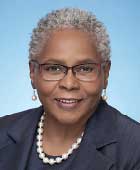Engagement of early career psychiatrists (ECPs) is one of my presidential goals. I described my thoughts on this goal in my Opening Session speech at APA’s 2018 Annual Meeting last May, and it continues to be high on my list of priorities. I always get some time with residents, fellows, ECPs, and junior faculty when I travel to speak at grand rounds or district branch/state association meetings and am continually impressed with the level of interest they have in making substantial contributions to the field. And I am more convinced than before of how much this goal aligns with my other goals—expanding our global mental health footprint and addressing those social issues that contribute to mental illness, that is, the social determinants of mental health.
ECPs are the workforce of the future, so we must spend some time focused on making sure they get the training and mentoring needed to be professionally successful and satisfied. That includes meeting and working with senior officials for mentoring and sponsorship. To my great surprise, however, many still don’t seem to know how to connect with individuals by whom they would like to be mentored and don’t understand the difference between mentoring and sponsorship. I find myself regularly reminding them that it is a well-established fact that no one in leadership got there by themselves and that learning from someone that you would like to model yourself after is important to achieving professional success. Most of us remember the great experiences we had after we showed our enthusiastic, energetic, and open young minds to psychiatrists we looked up to when we were early in our careers.
Exposure to those seasoned and established individuals in academic, clinical, and research areas is what has kept most of us involved in APA as well as the profession. Who doesn’t remember that favorite teacher that inspired and encouraged us? I know I still smile when I remember some of these folks, some gone but many still around. Well, the same holds true for psychiatrists entering the field today.
We have to remember that this professional period is called “early career” because it is the beginning—it is the time when there is much to learn whether we realize it or not and where we learn sometimes without realizing that we have had a lesson. It is essential that for APA and the profession of psychiatry, we do everything possible to actively engage our ECPs. We need their voices at the table, making decisions about the future of APA and the profession. They need the skills required to weigh in on our efforts to advocate for full implementation of parity, push back at discriminatory and oppressive regulations that negatively affect us and the patients we serve, and be prepared for the paradigm shift in the field likely to come with future health and mental health reforms.
Speaking of involvement in APA, you came out in droves asking for component appointments, and while there were not enough slots for everyone to receive an appointment, you can still get involved in many other ways. Make sure you learn more about APA’s component structure. Appointments are made annually on a rotating basis, and all component leaders are looking for members who are knowledgeable, committed, and ready to do the work. Also, think about sharing your knowledge and expertise by offering to contribute to one of
Psychiatric News’ columns or
APA’s blog. If you use social media, you may want to use these vehicles to share your perspective about the impact of new technology and innovation through an understanding of the use of social media to educate and inform patients, families, and communities.
Finally, take advantage of opportunities to join the leadership teams at APA. You can become active in your district branch or state association or consider running for office. We have just entered the next election cycle, and the
deadlines for nominations is October 1. And as always, continue to communicate your ideas and concerns to us. We need to hear from you—all of you—if we are going to have the future we all want. ■

